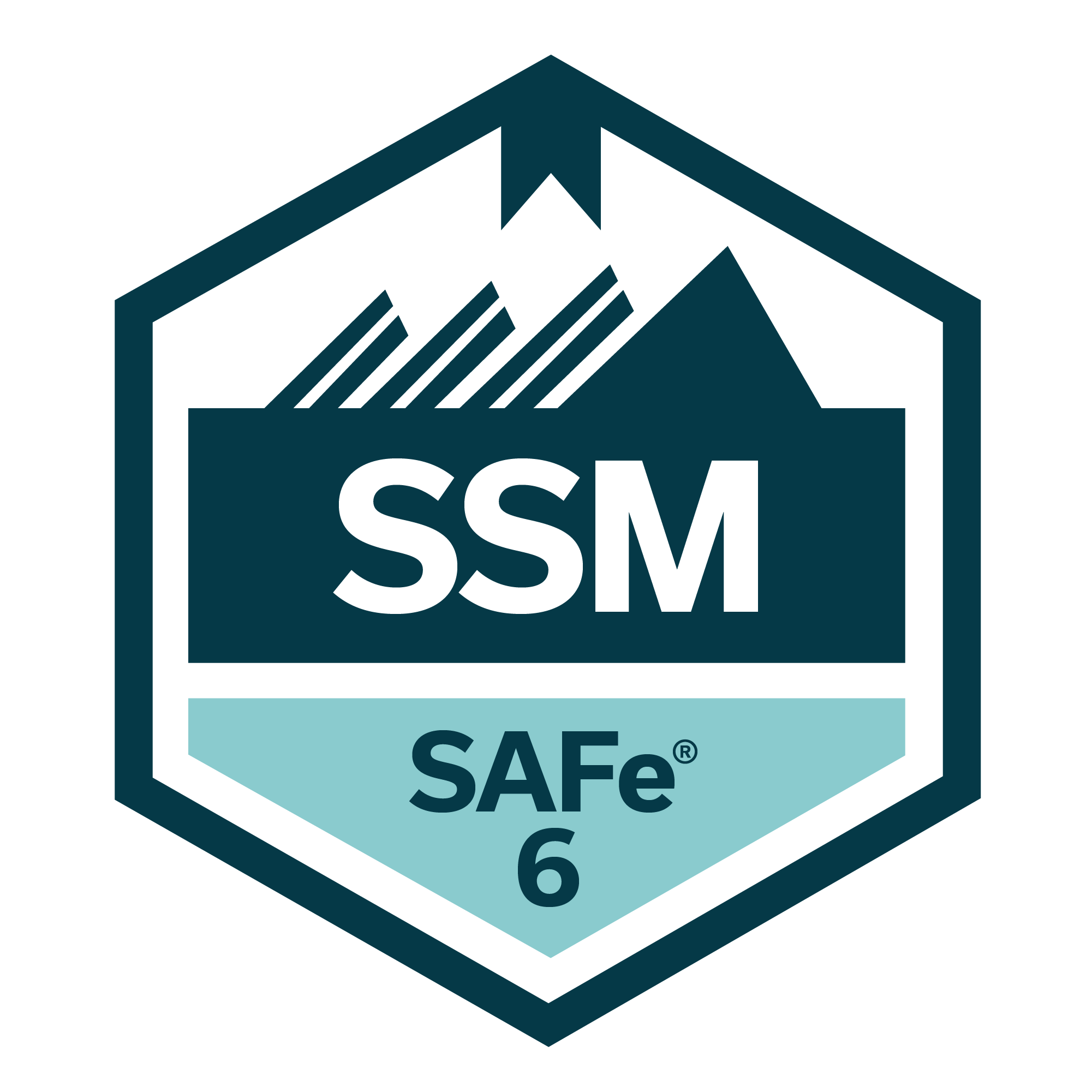Certified SAFe® Scrum Master (SSM)
Applying the Scrum Master Role within a SAFe® Enterprise.
Do you know story-points?
In this two-day SAFe Scrum Master training, you’ll learn the role of a Scrum Master in a SAFe enterprise. Unlike traditional courses focused on team-level Scrum, this course covers Scrum’s role across the enterprise and prepares you to plan and execute the PI (Planning Interval) for alignment at all organisational levels. You'll understand scaled Agile development, enterprise-wide Scrum facilitation, and iteration planning.
Course Outline
Part 1: Introducing Scrum in SAFe
Examine basic Agile development concepts
Discuss Scrum basic concepts and values
Identify an Agile Team in the Scaled Agile Framework (SAFe)
Part 2: Characterizing the Role of the Scrum Master
Responsibilities of the Scrum Master
Characteristics of an effective Scrum Master
High-performing teams
Team events
Coach the Agile Team using powerful questions
Collaborate with other teams
Resolve team conflicts
Part 3: Experiencing PI Planning
Prepare to experience PI Planning
Create and review draft PI plans
Finalize plans and establish business value
Review final plans and commit to a set of PI Objectives
Facilitate an effective PI Planning
Part 4: Facilitating Iteration Execution
Plan the Iteration
Track the Iteration progress
Refine the Backlog
Facilitate the Iteration Review
Facilitate relentless improvement
Support DevOps and Release on Demand
Part 5: Finishing the PI
Coach the IP Iteration
Prepare the team for the Inspect and Adapt event
Part 6: Becoming a Certified SAFe Scrum Master
Becoming a Certified SAFe Scrum Master
Audience/Prerequisites
Intended for people new to the role of the Scrum Master, or people wanting to better understand the role and how it fits in a SAFe enterprise, attendees typically include:
New or existing Scrum Masters
Team Leads
Release Train Engineers
You will learn
Identify the key components of Agile development
Identify the key elements of Scrum
Describe Scrum in a SAFe enterprise
Describe the roles and responsibilities of the Scrum Master
Identify the characteristics of an effective Scrum Master
Experience PI planning and explore how to facilitate this event
Support effective Planning Interval (PI) execution
Experience a complete iteration
Explore how to effectively facilitate iteration planning, backlog refinement, team and system demos, and the iteration retrospective
Identify ways to track iteration progress and foster collaboration and synchronization between the teams in the ART (Agile Release Train)
Explore improvement at the ART level with the Inspect and Adapt workshop
Support relentless improvement •
Coach Agile teams for maximum business results
Support DevOps implementation
What you will get
Attendee workbook
Preparation and eligibility to take the SAFe® Scrum Master (SSM) 6.0 certification exam
One–year membership to SAFe Studio
Course certificate of completion
Attendees must attend both days of the course in order to qualify for the exam.
Attendees may be eligible to apply for 15 PDUs toward their continuing education requirements with the Project Management Institute (PMI) for PMP, PgMP, and PMI-ACP certifications
Attendees may be eligible to apply for SEUs under category C, toward earning or renewing their CSP through Scrum Alliance
Credits/Exam
Exam name – SAFe® 6 Scrum Master Exam
Exam format – Multiple choice (one answer) or multiple select (2-3 answers)
Exam delivery – Web-based (single-browser), closed book, no outside assistance, timed
Exam access – Candidates can access the exam within the SAFe Community Platform upon completion of the SAFe® Scrum Master course
Exam duration – Once the exam begins, candidates have 90 minutes (1.5 hours) to complete the exam
Number of questions – 45
Passing score – SSM 6 = 33 out of 45 (73%)
Language – English
Exam cost – First exam attempt is included as part of the course registration fee if the exam is taken within 30 days of course completion. Each retake attempt costs $50.
Retake policy – Second attempt on exam (first retake) can be done immediately after first attempt. Third attempt requires a 10-day wait. Fourth attempt requires a 30-day wait.


